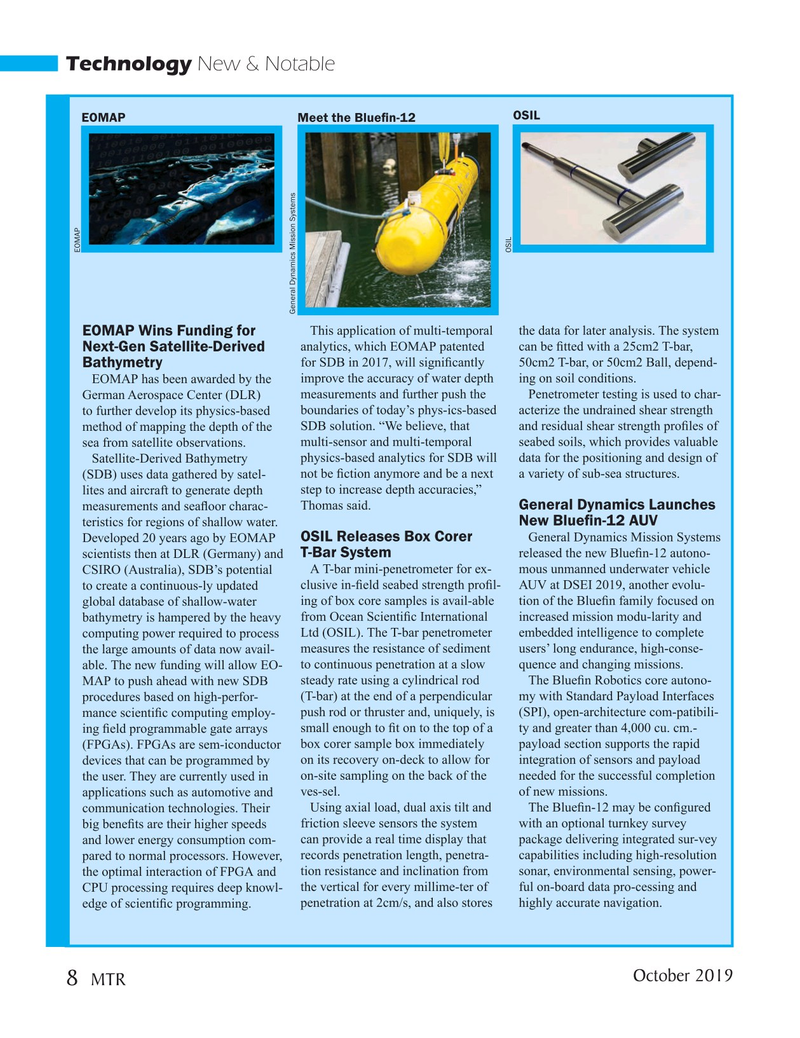
Page 8: of Marine Technology Magazine (October 2019)
Ocean Observation: Gliders, Buoys & Sub-Surface Networks
Read this page in Pdf, Flash or Html5 edition of October 2019 Marine Technology Magazine
Technology New & Notable
OSIL
EOMAP Meet the Blue? n-12
EOMAP
OSIL
General Dynamics Mission Systems
This application of multi-temporal the data for later analysis. The system
EOMAP Wins Funding for analytics, which EOMAP patented can be ? tted with a 25cm2 T-bar,
Next-Gen Satellite-Derived for SDB in 2017, will signi? cantly 50cm2 T-bar, or 50cm2 Ball, depend-
Bathymetry
EOMAP has been awarded by the improve the accuracy of water depth ing on soil conditions.
German Aerospace Center (DLR) measurements and further push the Penetrometer testing is used to char- to further develop its physics-based boundaries of today’s phys-ics-based acterize the undrained shear strength method of mapping the depth of the SDB solution. “We believe, that and residual shear strength pro? les of sea from satellite observations. multi-sensor and multi-temporal seabed soils, which provides valuable
Satellite-Derived Bathymetry physics-based analytics for SDB will data for the positioning and design of (SDB) uses data gathered by satel- not be ? ction anymore and be a next a variety of sub-sea structures.
lites and aircraft to generate depth step to increase depth accuracies,”
General Dynamics Launches measurements and sea? oor charac- Thomas said.
New Blue? n-12 AUV teristics for regions of shallow water.
OSIL Releases Box Corer
Developed 20 years ago by EOMAP General Dynamics Mission Systems
T-Bar System scientists then at DLR (Germany) and released the new Blue? n-12 autono-
CSIRO (Australia), SDB’s potential A T-bar mini-penetrometer for ex- mous unmanned underwater vehicle to create a continuous-ly updated clusive in-? eld seabed strength pro? l- AUV at DSEI 2019, another evolu- global database of shallow-water ing of box core samples is avail-able tion of the Blue? n family focused on bathymetry is hampered by the heavy from Ocean Scienti? c International increased mission modu-larity and computing power required to process Ltd (OSIL). The T-bar penetrometer embedded intelligence to complete the large amounts of data now avail- measures the resistance of sediment users’ long endurance, high-conse- able. The new funding will allow EO- to continuous penetration at a slow quence and changing missions.
MAP to push ahead with new SDB steady rate using a cylindrical rod The Blue? n Robotics core autono- procedures based on high-perfor- (T-bar) at the end of a perpendicular my with Standard Payload Interfaces mance scienti? c computing employ- push rod or thruster and, uniquely, is (SPI), open-architecture com-patibili- ing ? eld programmable gate arrays small enough to ? t on to the top of a ty and greater than 4,000 cu. cm.- (FPGAs). FPGAs are sem-iconductor box corer sample box immediately payload section supports the rapid devices that can be programmed by on its recovery on-deck to allow for integration of sensors and payload the user. They are currently used in on-site sampling on the back of the needed for the successful completion applications such as automotive and ves-sel. of new missions.
communication technologies. Their Using axial load, dual axis tilt and The Blue? n-12 may be con? gured big bene? ts are their higher speeds friction sleeve sensors the system with an optional turnkey survey and lower energy consumption com- can provide a real time display that package delivering integrated sur-vey pared to normal processors. However, records penetration length, penetra- capabilities including high-resolution the optimal interaction of FPGA and tion resistance and inclination from sonar, environmental sensing, power-
CPU processing requires deep knowl- the vertical for every millime-ter of ful on-board data pro-cessing and edge of scienti? c programming. penetration at 2cm/s, and also stores highly accurate navigation.
October 2019 8
MTR
MTR #8 (1-17).indd 8 10/10/2019 9:09:06 AM

 7
7

 9
9
